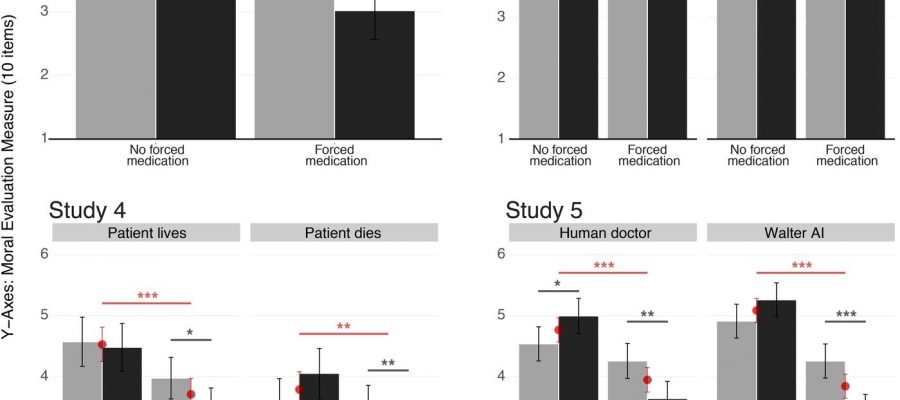![The effects of all study-specific between-subjects manipulations on moral evaluations (higher scores [min 1–7 max] indicate a more positive moral evaluation of a decision). Study 3: High Competence and Low Competence refer to the description of the human or robot nurse in terms of their competence as nurses; Study 4: Patient lives and Patient dies refer to the outcome of the nurse's decision, whereby the patient either lived or died; Study 5: Human doctor and Walter AI refer to the supervising doctor (Walter AI is an advanced artificial intelligence) who told the human or robot nurse to forcefully medicate their patient. Error bars are 95% confidence intervals. The red points are the means of the levels of Forceful medication (Did not force medication vs. Forced medication). The following pairwise comparisons are labeled: (i) human versus robot when deciding to not force medication, (ii) human versus robot when deciding to force medication, and (iii) did not force medication versus forced medication averaged across both nurses, ***p < .001, **p < .01, *p < .05. Credit: <i>European Journal of Social Psychology</i> (2022). DOI: 10.1002/ejsp.2890 Can robots have morals? Robots' decisions on forced medication evoke doubts](https://scx1.b-cdn.net/csz/news/800a/2022/can-robots-have-morals.jpg)
A study, recently published in the European Journal of Social Psychology and completed at the University of Helsinki, investigated people’s judgments toward decisions made by nursing robots.
Based on the study, it seems that human sensitivity and empathy are required from AI-based medical applications in order for patients to consider their solutions and decisions as equally acceptable as those made by humans.
“Research in moral psychology has paid little attention to patient autonomy or internal conflicts in medical ethics—especially from the perspective of having robots as actors,” says researcher Michael Laakasuo.
According to Laakasuo, the goal of the study was to expand the field of experimental moral psychology towards the examination of medical ethics.
People not convinced by the moral responsibility of nursing robots
As an element of the study, study subjects assessed the morality of medical decisions made in a fictional story. People were accepting of both a robot or a human nurse making a decision not to comply with a chief physician’s instructions to medicate a patient against their will. In contrast, they found it unacceptable for the nursing robot to overrule the will of the patient by medicating them forcefully, although a similar decision by the human nurse was accepted.
“The question pertaining to forced medication revealed that decisions made by robot nurses and human nurses are not treated in the same way even if they have identical consequences,” Laakasuo says.
“What may be the most worrying finding is that when the story was changed to have the patient die of a sudden bout of illness during the night, the human was perceived to be more morally responsible for the patient’s fate than the nursing robot, although there was no connection between the therapeutic decision and the patient’s death.”
Robots are not a simple solution to the lack of human resources
“The findings could provide useful perspectives on the development of smart medical applications and robotics,” Laakasuo muses.
The health care sector is struggling with a global shortage of nurses. The results of the study indicate that this lack of resources cannot be comprehensively solved with the help of machines—people still want to have other people care for them in the future.
Source: Read Full Article
